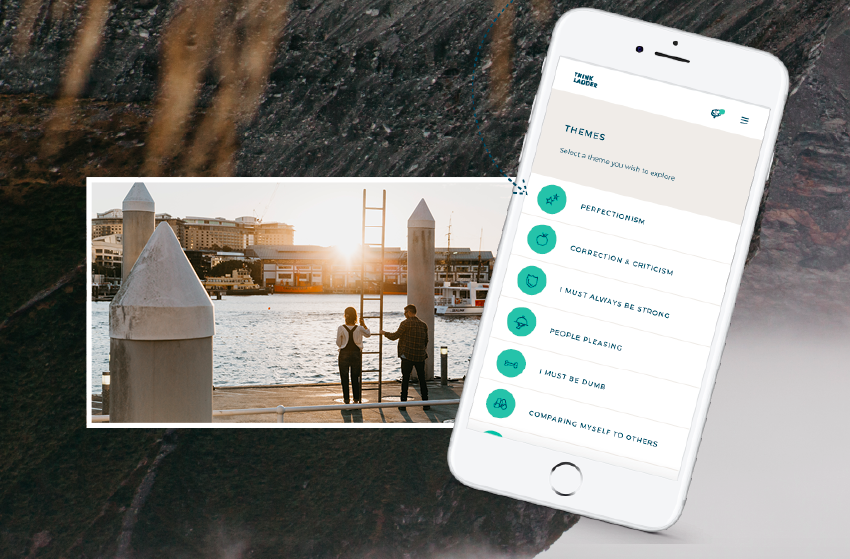Therapist in your pocket: How Thinkladder is using tech to tackle anxiety and depression

“Even though I’m not a therapist, I was using cognitive behavioural therapy (CBT) tools to unpack their beliefs,” Gatt says. “These guys were all over it, they loved it, but if I said to them, ‘There’s this therapist down the road and we’ll pay for you to go,’ they were like ‘no.’ And so, that got me thinking, how do we get CBT into their hands? How do we get it into their pocket? They’re all over their phone, so that seemed like the natural outlet. So, I said to Kate [Gatt’s wife, co-founder and counsellor] ‘I want to try and automate CBT.’”

Kate and Mark Gatt
CBT is a form of psychotherapy commonly employed by therapists. It’s used to treat problems such as anxiety and depression by modifying emotions, behaviours and thoughts while boosting happiness. Instead of probing to get to the root cause of the conflict, people are encouraged to challenge distorted thoughts or emotions and change destructive patterns of behaviour.
While the App Store is brimming with meditative apps, the Gatts scouted far and wide to see if anyone had attempted a far more ambitious goal: combining modern-day technology with neuroscience and a user-friendly interface within a phone app. They couldn’t find anything.
Thinkladder was born, with the name taking inspiration from the journey people go on to climb back to better mental health, rung by rung.
While the idea for the app came from Gatt’s interactions with people in at-risk environments, he realised people were neglecting their mental health in all walks of life.
“I had mates saying, ‘I was thinking I should go to a counsellor.’ Years later, they’d say ‘I’m still thinking about going’. That’s when it got a bit broader and we thought this could be a good tool for anyone. Almost everyone I talk to has had something going on mentally and could do with a mental check-up, whether it’s conflict at work or home stress.”
But it hasn’t been easy. Thinkladder has been a two-year journey of creating “the Google of cognitive pathways”. In other words, the Gatts and a developer have had to build a complex digital database that holds hundreds – and soon, thousands – of beliefs and the symptoms associated with them, as well as suggestions on how to rewire the thought.

Kate Gatt, who is a counsellor, and five additional therapists have been crafting the vast amount content for the app, which has launched with four themes, such as self-worth.
Users can then explore symptoms they identify with, such as ‘I don’t feel good enough to be loved’ and use the app to find insights into their unwanted habits and automatic thoughts and moods.
It then allows them to reverse the negative thought with an empowering, positive insight, like ‘I am on my journey toward wholeness, and at every point of the way I am worthy of love.’
These insights are saved in a ‘gallery’ on the app, where the user can also set up reminders and alerts based on the time of day or their location, such as the airport if they experience travel anxiety.
Almost everyone I talk to has had something going on mentally and could do with a mental check-up, whether it’s conflict at work or home stress.
Meanwhile, an audio insights tool acts like a meditation app, but will instead say insights saved to their gallery that are personalised to each user.
The app is aimed at people in their late teens right up until their 40s, but marketing has been specifically targeting Instagram users.

Thinkladder is entirely self funded by the Gatts and is set up as a social enterprise, so for each $5 app sold, a free app will be given to a secondary school or organisation.
Gatt says the hope is the app becomes a gateway into traditional therapy, but it will also save people lots of time and money as they can show up with their insights.
“With Thinkladder, you’re getting very specific CBT insights, which would normally cost you hundreds of dollars,” he says. “We’re providing thousands.”
There’s also a ‘psych toolkit’ on the app which offers advice on what do if you’re feeling vulnerable, how to find the right counsellor or therapist and who to contact for further support.

Version one of the app went live in October. In the future, Gatt says they’d love for Thinkladder to become a link that connects people wanting to find a therapist with professional help. The big data aspect means in the future, it could be possible to start pooling together anonymous data on specific behavioural insights and demographics that could help therapists.
“If we can go to scale, we can say to therapists, with every 25-year-old girl who’s from this social background that holds this belief, there’s an 80 percent chance that these symptoms will be fueling it because our data proves that.”
But perhaps most importantly, Thinkladder is building a community of people who want to get a dialogue started around mental health. It’s using Instagram – and influencers – to spread its message, and had movers and shakers like artist Andrew J. Steel on board for its launch.
Gatt hopes this will help alleviate New Zealand’s alarming mental health problems. Earlier this year, a Unicef report found Aotearoa has the highest youth suicide rate in the developed world, while the People’s Mental Health Review conducted by Action Station and Mike King found New Zealand Police are responding to 90 mental health-related calls every 24 hours.
“There’s been amazing efforts to break down stigma, but I’ve had a couple of people tell me that while breaking stigma is all good, no one’s given them anything that’s going to help,” Gatt says. “We’re on the stigma mission as well, but we actually want to give people tools.”
Thinkladder is available on the App Store now. Find them on Instagram at @Thinkladder.




